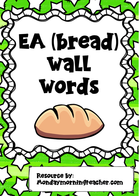
For some reason, I am having trouble making the picture clickable, but if you go to the Literacy Resources section, you'll be able to access the EA (bread) file under North Lanarkshire Stage 1/2/3 Resources.
Enjoy your break when it comes!

| Monday Morning Teacher |
 We have our October holiday after this coming week, so I'm hoping to get a few weeks ahead with the Stage 3 flashcards, for anyone who is using them. But I have managed to get EA done, so they are ready for you to print out and use. For some reason, I am having trouble making the picture clickable, but if you go to the Literacy Resources section, you'll be able to access the EA (bread) file under North Lanarkshire Stage 1/2/3 Resources. Enjoy your break when it comes!
0 Comments
Second week of school finished, and still huge amounts to organise. I think the beginning of the school year is a bit like childbirth - your brain blocks out just how difficult it is, so you'll eventually do it all over again! I have managed to finish all of the Magic E flashcards, though - which you'll need soon, if you are following North Lanarkshire's Stage 2 programme. If not, hopefully they will be useful some time later in the year. In Magic E words, the vowel makes it 'long' sound, or it 'says its name'. We all know this, and it often seems fairly straightforward to teach. As I've been listening to my new class sound out words, read their books, and write down a bit about their summer for me, I've realised that a few of my kiddos keep forgetting that vowels can say their names in words, and not just make their vowel sound. If children don't realise that A can make both the short a (cat) and long a (cake) sounds (we won't even get into the other sounds that it can make!), it must all be quite confusing. And it's no wonder some kids can find it difficult to retain these phonemes. So - a few of us will be doing a bit of work on 'A, E, I, O, U' next week. Here's a great video I used a lot with my P1s at the beginning of last year. They loved it, and it reinforced the vowel names, so when we came across words with long vowel sounds, they weren't as confusing. 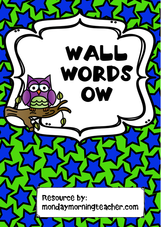 Just trying to get all of the flashcards that are finished uploaded, before I forget that I haven't done them. As always, you can click on the picture to download this resource, or just click here. 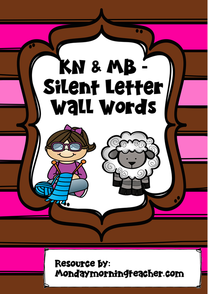 I'm planning to teach both FF and KN next week, rather than teaching them over 2 different weeks, as most of the kids in that Phonics group know them anyway. So I needed this resource right away. It's nice to have MB finished as well, and ready for the following week. I think I only need to do the 'magic e' flashcards, then all of Stage 2 will be finished and available for others to use. I'll let you know when that happens, but hopefully soon. Get the KN & MB cards by clicking on the picture or by clicking here. My daughter has been (very kindly) laminating and cutting out all of my flashcards for me, then organising them into 'Stage 2' and 'Stage 3' phoneme folders. She puts all of the flashcards for a given phoneme into a polypocket, which she then labels with that phoneme. All of the phonemes are in the North Lanarkshire order, so it's very easy to find each week's resources. As the weeks go by, and I plan/create different activities for each phoneme, a template or resources for that activity will go into the polypocket - ready for the next time I teach P3. I think this is what is a bit sad about moving stages...I already have a similar folder organised and ready to go for Primary 1....ah, well. Such is life, right? And when/if I ever move back to Primary 1, I'll be ready to go (except by then, I may well be dissatisfied with the way my P1 resources look...in which case this process may well start all over again).Nor Off to enjoy a Friday night movie in the living room, I think. Such excitement! 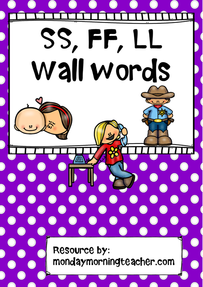 Silly me - I started this flashcard project with the beginning of Stage 2, because those phonemes are reviewed during the first 5 weeks of Stage 3, which I assumed I would start with (I also have a few kiddos who will be going onto Stage 2 phonemes this year). When I finally looked more closely at my handover notes, I see that my kids are starting (next week!) on FF (Stage 2, Week 35!). So I've been rushing to get these finished, and here they are. Then just 2 more weeks of Stage 2, and I'll be able to get back to work on Stage 3 phonemes. However - if you are a Stage 3 teacher, you should be fine with the Stage 2 flashcards, as you'll need to be reviewing those at the start of the year with your class. Welcome to anyone who has come over from the Scottish Teachers FB pages - I hope at least some of these resources are useful! I don't think there is a way to follow this page, but I've started a Monday Morning Teacher page on FB - if you like that, I'll post there whenever I add a new post/resources, so you'll get a notification. Back to school is hectic! I've been trying to get all of the North Lanarkshire Stage 2 phonemes printed off at work (3 different teachers need them, either because we are teaching Stage 2 phonemes to our classes for the first time, or because we are reviewing Stage 2 phonemes before moving on) - and I realised I hadn't finished Week 3 review phonemes - such a bummer, when you think you've finished them!
These Week 3 phonemes are first taught at the end of Stage 1 - so if you are teaching Primary 1, bookmark this page, so you can come back in the Spring! But for those of you who will be reviewing these phonemes shortly, here are the OY, OA and QU picture flashcards. AI is also reviewed during Week 3, but those flashcards have been posted together with the AY cards (I thought it made sense to put the long A sounds together). Apologies for the strange combination of sounds in a single file, but I wanted to get them done as quickly as possible. I've promised my daughters we'll watch a quick episode of Parks & Recreation, so I'm off - hope these are useful! And please keep checking back - I know I have a few more Stage 2 phonemes to finish off., and I'll hopefully be getting to those very soon. 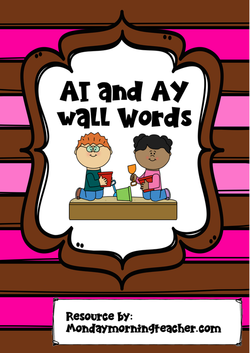 Today has been a busy day - I was helping out at a Holiday Club this morning, then took my daughter and a friend swimming this afternoon. My husband is currently getting dinner on the table, so we can run the two girls up to gymnastics practice (which starts very soon!). But I managed to get most of this LONG A resource finished last night - just needed to finish off a few things before I could get it posted. I was pleased with the picture of the children playing with sand pails for the front (it's good when you can be pleased by the simple things, right?). Link is clickable, as always. There are quite a few picture flashcards for both phonemes (dipthongs for Americans), organised in difficulty order. Hopefully this will be useful - I thought it made sense to put these two long A sounds together. I'm still working on finishing all of the CVCe picture flashcards (which will have the A-E spelling pattern in it, of course). Now - this evening I really do have to start getting some actual 'Back to School' planning done, as we are starting again in a week and a half (and we are away on holiday most of next week - eek!). 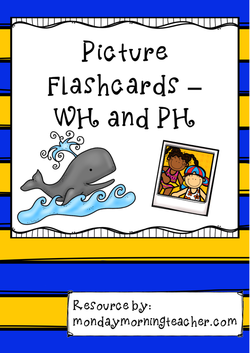 In the North Lanarkshire Active Literacy programme, all of the 2 letter combinations that make a single sound are referred to as 'phonemes', so that's what I tend to use when I'm writing about them. In the States, however, consonant phonemes and vowel phonemes are differentiated. Sounds like 'WH' and 'PH' are called digraphs, while vowel or vowel/consonant combinations like EW are referred to as dipthongs. Gets a bit confusing! In other literacy programmes, there is much more emphasis on 'consonant blends' - which is something that the North Lanarkshire programme doesn't really focus on. Some kids pick the blends up easily, while others need more practice. I do think it is helpful to be able to build up word difficulty more slowly for some groups, so I've tried to include words (grouped together) that work on initial and ending blends when kids are learning a given phoneme (digraph/dipthong). Hope this quick explanation helps, for any visitors to the site from the States. 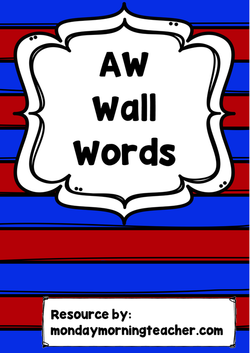 The next set of Wall Words/flashcards are ready. AW is first introduced in Week 10, if you are following North Lanarkshire's Stage 2 phoneme programme. It is reviewed during Week 1 of NL Stage 3 - so if you are teaching Primary 3 this year, you'll need these right away. When you open the file, don't worry if the font looks unclear. It doesn't look great on my copy of the PDF file either, but when you print it out, the lettering looks clear and crisp. I think there must be something a bit odd about the way that the font I've used is interacting with the display aspect of Acrobat. But the new fonts I've been trying out on the cover pages are so cute (much better than Comic Sans!), I think it's worth it, since everything prints out OK. All of the flashcards I've made use the same font, so if you choose to use them, they will all coordinate. Please let me know if you have any problems, and as always, feel free to send other teacher friends along to the site, if you think they might be able to use these flashcards in their own classes. Along with having a wonderful visitor (my cousin) from the States this week, I've been hard at work finishing off Stage 2 and 3 phoneme flashcards/wall words. I just finished them all today (and I must say - I'm beginning to have quite an addiction to cute clipart from Teachers Pay Teachers!). Hopefully this weekend, or perhaps early next week, I'll be able to look into what steps I need to take to convert my Word files into files I can post on the Internet.
If you are working with North Lanarkshire's Active Literacy programme in the Infant department, please do check back! 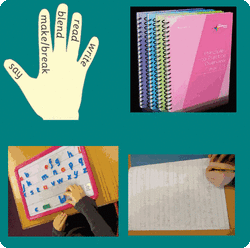 The images to the left will be familiar to anyone working with North Lanarkshire's Active Literacy programme, I'm sure (although the book covers have changed). Having taught Primary 1 for the last couple of years, I have Active Literacy Stage 1 resources covered. However, since I'm moving to Primary 3 next year, I'll need resources for Active Literacy Stages 2 and 3 - which is a lot of resource creation! When I'm teaching a new phoneme, I like to have flashcards with that week's phoneme that the kids can read as a class as part of our introductory mini-lesson on that phoneme. These flashcards then go up on our 'Phoneme Word Wall', as a permanent reference resource. I give the class different activities based on that week's 'Wall Words' to reinforce phoneme learning throughout the week - so I get a lot of mileage out of these flashcards. Because I use them so much, I want the flashcards to look good and to be appealing to the kids. I also want to make sure they are accessible to ALL of the children in the class, so I find pictures to go with each word (there are a few exceptions - I haven't found pictures for words like 'have' and 'live', I'm afraid). Once I have all of the flashcards done for the Phoneme Wall, I'm planning to turn the wall words into 'bean bag' cards for our bean bag game (which I'll hopefully tweak a bit for the older children, to make it a bit more challenging...that's still a job for the future, though). I'm currently making the flashcards for Week 30 of Stage 3 - it's such a good feeling to know that once they are all made, printed out, laminated and cut out (OK - so there is quite a bit of work still to be done!), my phoneme programme will be good to go for the year. That should free up quite a few Sunday hours throughout the school year! After Stage 3 is finished, I'll move back to Stage 2. My technical consultant (my husband!) is home from Africa, so hopefully he'll be able to help me convert all of my files so that I can post them on-line for others to use. Under the terms of use for much of the clipart I'm using for the pictures, all files must be 'flattened', so that the clipart can't be easily extracted. Please do keep checking back, though, as I'm hoping to start getting files up in the next week or so... 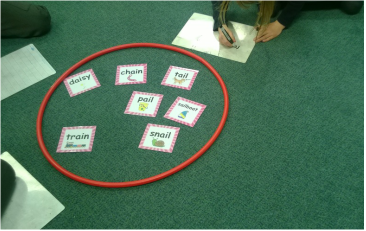 This past year, my goal was to revamp my numeracy teaching - so I've added lots of games, maths rotations and small group teaching. Although literacy has been rolling along relatively well, I've wanted to include more literacy-based games into our reading and spelling time. It's been more of a challenge (and I definitely think that it is sensible to tackle one change at a time in a classroom!), but here is a game my kids really enjoy. Played in groups of 2 or 3, the kids put word cards inside a hula hoop (pictured). This picture is from the week we worked on the 'ai' phoneme. They then take turns tossing a bean bag onto the cards. Whichever card your bean bag lands on, you have to spell the word on your white board (one of the other kids holds the card and checks for correct spelling). If you spell it correctly, you win the card. If not it goes back into the hula hoop and play passes to the next person. Since introducing this game, I've never seen kids more eager to practice their spelling words. Some of the kids will even pull this game out during 'choosing time' - our 10 minutes at the end of the day when everyone can choose something fun to do with their friends in the classroom. This is great for your kinaesthetic learners! For anyone interested in trying this with your own class, here is a link to the 'ai' cards we use for this game. If you are working with North Lanarkshire's active literacy programme, this game would be good for beginning of the year Primary 2 classes, when they review the ai phoneme, and end of the year Primary 1, when kids are introduced to the ai phoneme for the first time. 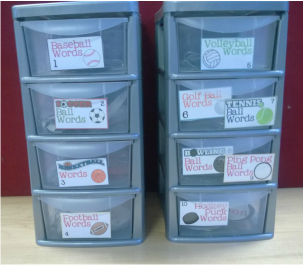 This year, I used 'ball words' from Differentiated Kindergarten in my class for the first time - they were fabulous! As I type, more than two thirds of my class have learned all 220 early sight words (Dolch words) - and they've done it all independently. You can see in the pictures how I store my ball words. I'll write more about these later, but if you are curious, please click on the links for a fuller explanation. As I was listening to kiddos who are still working to master their ball words today, though, I was thinking about how we help kids develop word attack skills. My son is dyslexic, so this is an area of the curriculum that I've thought and read a lot about. In our school, we use North Lanarkshire's Active Literacy programme, which emphasises the ability to break words down into their sounds/phonemes and 'sound words out'. Which is all well and good - but what about trickier words? And things that don't seem to follow the rules we teach our kids? And how do we help those kids who need a bit more time and more support to remember the sounds that different phonemes make? For me, two keys have been: 1) repetition, repetition, repetition and 2) giving kids as much information as possible about the words they are reading. When kids are practicing their sight words and get stuck, I prompt for what the phoneme says, and if possible, I link my question to words they already know (for example, every time we get stuck with 'ay', I point to the 'day of the week' up on our white board. That's usually enough to remind them that 'ay' makes the long 'a' sound, and they can figure out the word). Some kids remember phonemes very quickly. Other kids need lots of repetition before it 'sticks'. But I also try to give them as much information about a word as I can, so that things that seem crazy 'make sense'. 'C' making an 's' sound, and 'g' saying 'j' are cases in point. When does this happen? When 'c' and 'g' are followed by 'i, e or y' (there are always exceptions, but luckily, primary 1s don't tend to pick up on them!). Now - they don't usually remember this when they are spelling the words (nise, anyone?), but when they are reading, these words don't confuse them. There is a rule that helps them make sense of it. And I've repeated that rule so often, it's stuck in the back of their memory somewhere, ready to be dragged out with a prompt or two. The more information we can give our kids to take the 'mystery' out of reading, the better. This year, we've also spent a lot of time talking about vowels and just what tricky little letters they are...if we sound out a word and it doesn't make sense, chances are, that vowel (or two) isn't playing by the rules and is making a different sound. There isn't always a rule for that one - but at least we know which letters we have to keep an eye on. Here's a picture of the first three 'ball word' sets, to give you an idea of how they are put together. I have 4-5 sets of each ball word, so there isn't an issue if several kids are working on the same list of words. |
Categories
All
About MeI have taught from P1-P5 (K-4th grade). You'll find a variety of resources and ideas appropriate for these year groups as you explore this blog. I'm glad you are here and I hope you find activities, ideas or resources that are useful in your own class. Archives
July 2020
|
|
2020 Monday Morning Teacher
|